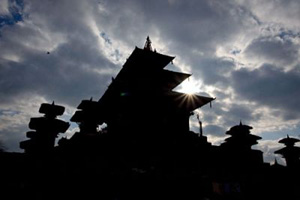 FOO CHEE CHANG |
I've lived most of my life at the northern end of the Kathmandu Valley, in the shadow of the Shivapuri massif. My views of the Himalaya were thus limited to seasonal glimpses from Patan or further afield. As a youth, however, I was not particularly enamoured of the mountains in any case. With the passage of time, I came to appreciate the Himalaya for their singular beauty and embarked on treks whenever I was back in Nepal. But my assumption was that as the valley choked, the mountains, save for an ever-narrowing window in spring and autumn, had really disappeared into the smog.
This season has been a real eye-opener. From where I live in Mangal Bajar, and cycling down to Hattiban, I've been treated to fantastic panoramas from Ganesh to Gaurishankar for days on end. They're just rock, ice and snow, of course, but the Himalaya never cease to charm. Imagine my delight when they reappeared in the new year, albeit with their nether regions obscured by a grimy layer of smog.
I'm grateful these views are still available?- their capacity to elevate remains undiminished in my eyes, even if their relative distance through the prism of pollution makes photos a couple of decades old look like bad photoshop experiments. Despite everything, the Kathmandu Valley is one of the more beautiful parts of the world. It's just too bad we've done so little to keep it that way.
No wonder then that some in the Newar community feel that enough is enough, and that as indigenous inhabitants they must reclaim the valley that through their endeavours alone is a world heritage site. As a representative of the Newa Rastriya Party put it the other day, "What have we got from 240 years of external rule?" While he insisted this did not imply non-Newars had no place in the capital, his lament that the valley was overburdened in every respect does suggest some Newars feel this way, if we are to view the nose-chopping incident of last Sunday's bandh in a certain light.
But while the world owes a debt to Newari culture, the Newars don't have more right over the Kathmandu Valley than any other community in Nepal, given the patterns of settlement here (reflected in the rest of the country) and the layers of interdependence that allowed the capital to prosper in the first place. Imagining we can re-establish demographic equilibrium under the guise of an ethnic Newar state is pure tomfoolery.
How then to save the valley from itself? If millennarian fantasies involving the wholesale inundation of the valley seem far-fetched, then the Great Earthquake that will devastate Kathmandu is only a matter of time. But that is hardly a premise on which to plan a new Kathmandu.
Shall we then wait for federalism to relieve the valley of its status as the hub of all Nepali endeavours? It's hard to imagine designating provincial capitals will achieve much beyond creating more levels of administration, and buildings in which to house them across the nation. Kathmandu will still remain the federal capital.
Is this the problem, then? From 1950 to 1990, 13 countries in Latin America, Africa and the former Soviet Union moved their capitals. Even the Indian capital moved from Calcutta to Delhi in 1911. Why not Nepal?
The rationales for such expensive and risky strategies, as assistant professor of political science at Southern Illinois University Edward Schatz explains, usually stem from nation-building efforts (particularly in post-colonial situations), economic and administrative justifications, or the whims of dictators. Taking Nepal out of the Nepal Valley doesn't quite fit that bill, but that in itself doesn't preclude taking the leap. Has anyone seriously considered moving the capital of the federal republic of New Nepal?
Rome wasn't built in a day. A new capital for Nepal won't materialise overnight, either. But if we don't even begin to talk about it, we may be missing out on a double whammy: the chance to throw the Kathmandu Valley a lifeline, and the chance to give another city a shot at the future. Any takers?



